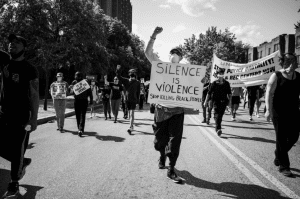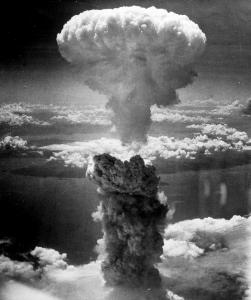
At an individual level, I’d be willing to bet most (1) white people in this country aren’t contemptuous of other races or ethnicities, at the very least not on a conscious level. But personal prejudice is not the only form racism takes. Systemic patterns that disadvantage people of color and profit whites are also a thing, and also deserve to be dealt with; they are also unjust and damaging (and are thus a threat to peace). And white people need to educate ourselves and be honest about the ways we profit from these patterns. (2) In other language, we don’t just need individual repentance for personal acts and attitudes that are either overtly bigoted or complacent: we need national repentance for national sin.
I don’t propose to prove that there is such a thing as national sin. A lot of conservatives protest the idea that there can be such a thing, on the grounds that nations are just aggregates of individual people, and it’s only the individuals that have real existence. But if this were true, well, there goes any notion of Just War Theory—how could a nation have the right to defend itself, if nations aren’t real things? And you can forget “Judeo-Christian values,” too, since they’re rooted in a book (the Torah) that quite explicitly treats national sin and national repentance as realities. So I’m going to treat that as a fact and move on to its implications.
(3) With respect to people of color, America is in a state of impenitent, largely unconfessed, and indeed largely unrecognized sin. Racism runs deep in us. It’s easy to talk about “the Frontier”; harder to realize that the overwhelming majority of this country was taken by force from First Nations, and some of those peoples were uprooted from their homelands and exiled; even today, the sovereign territory of First Nations is repeatedly violated, in defiance not only of justice but of explicit guarantees made by the United States government. As for black Americans, most were brought here by the slave trade, and even when slavery was legally ended through the Civil War, segregation kept them a legal as well as a social underclass. It’s still less than seventy years since segregation was repealed; did we really think it didn’t still have societal consequences? Visiting the iniquity of the fathers upon the children, the source of Judeo-Christian values says, unto the third and fourth generation.

So what penance do we need to do to make this right? I am no expert. Reparations—particularly to First Nations, blacks, and Hawaiian islanders—would be appropriate, though I don’t know how they’d work and they really wouldn’t be enough. Getting the average white guy to appreciate the fact and colossal scale of the problem is needed, and is probably the place to start.
Circling back to Brandt Jean’s decision to forgive his brother’s murderer, we now have some context to appreciate the outrage surrounding it. The point was not, for most people, that Jean should not have forgiven, nor that any forgiveness that took place should have been secret. It’s that having white people, who participate in a system that has historically benefited them at the expense of people of color, cheering for a person of color being gracious to a white person, is—let’s be gentle and call it tacky. When you factor in the additional facts that the white person in question was a cop (who have a history of being the specific enforcers of white power over POCs) and received a fairly lenient sentence for murder (and in a former slave state that just loves jailing people), the tackiness becomes extreme.
There is also a much darker and more urgent side to the furor. Joshua Brown, a key witness in the Jean case, was shot and killed less than two weeks after giving testimony. (4) Nor is Brown’s death an isolated incident: six young men connected with the 2014 protests in Ferguson have been killed, at least two in confirmed homicides (both were shot and found later in torched cars). One activist, Rev. Darryl Gray, discovered a strange box in his car that, when investigated by the bomb squad, turned out to contain a six foot long python. The need for white Americans to repent isn’t only a question of online faux pas or half-hearted anti-racism, it’s a matter of violence. (5) Without repentance, making the gestures of forgiveness enables evil instead of defeating it.
There is a lot that I’m leaving out here, especially about the way class and race interact in America, and the implications that has for recognizing and repenting of national sins. But this post is pretty hefty as is, so I will leave it here.
(1) Most, i.e. at least 51%. Hopefully higher!
(2) Note: educate ourselves, not go around demanding free education from people of color; and be honest about, not be noisily ashamed of.
(3) I’ve here used the terminology that I understand to be most widely preferred by people of color; I hope I haven’t been mistaken, and I apologize if I tread on any toes.
(4) A police search of Brown’s apartment found bags of weed that were totally already there when we got here, you guys. So the facts that he had no known enemies and did have a steady and secure income, and that he was afraid to testify because he was scared he’d get shot, are definitely not relevant or suspicious.
(5) Do not even think the words black-on-black crime, please and thank you. In addition to being a distraction from anything useful you could be doing, like asking yourself whether maybe you do profit from an unjust system and whether you might be able to help fix it, it also tends to have racist implications: we don’t call it white-on-white crime when a white guy robs a convenience store; nor, perhaps more tellingly, do we call it white-on-black crime when a white person kills a black person. The reason I specify that white Americans need to repent is that, generally speaking, we’re the ones profiting from an unjust system.
Images via Pixabay












